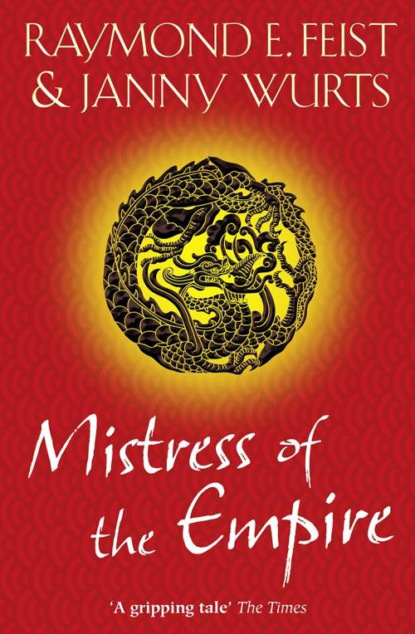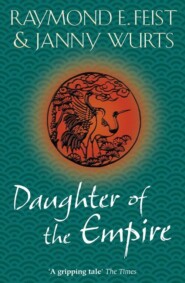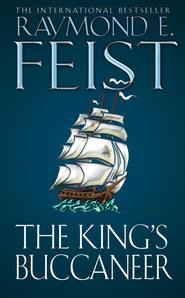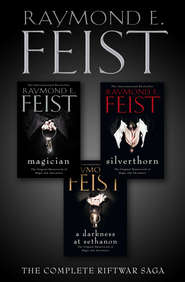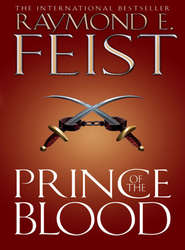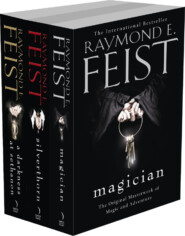По всем вопросам обращайтесь на: info@litportal.ru
(©) 2003-2025.
✖
Mistress of the Empire
Автор
Год написания книги
2018
Настройки чтения
Размер шрифта
Высота строк
Поля
Jiro’s brows rose in surprise. ‘But why? What has the tong to gain by killing Mara?’
A runner servant appeared at the screen that led into the main estate house. He bowed, but before he could speak, Chumaka second-guessed the reason behind his errand. ‘Master, the court is assembled,’ he said directly to his Lord; Jiro waved the servant off as he rose from his cushions. As master and First Adviser fell into step toward the long hall in which the Lord of the Anasati conducted business, Jiro surmised aloud, ‘We know that Tasaio of the Minwanabi paid the Hamoi Tong to kill Mara. Do you think he also paid them to attempt vengeance upon her should he fall?’
‘Possibly.’ Chumaka counted points on his fingers, a habit he had when ordering his thoughts. ‘Minwanabi revenge might explain why, seemingly from nowhere, the tong chose to act after months of quiet.’
Pausing in the shadow of the corridor that accessed the double doors of the great hall, Jiro said, ‘If the tong acts on behalf of some pledge made to Tasaio before his death, will it try again?’
Chumaka shrugged, his stooped shoulders rising like tent poles under his turquoise silk robe. ‘Who can say? Only the Obajan of the Hamoi would know; he alone has access to the records that name those deaths bought and paid for. If the tong has vowed Mara’s death … it will persevere. If it merely agreed to make an attempt on her life, it has fulfilled its obligation.’ He gestured in rueful admiration. ‘The Good Servant has her luck from the gods, some might argue. For anyone else, an agreement to send an assassin is a virtual guarantee of success. Others have avoided the tong, once, even twice before; but the Lady Mara has survived five assassins that I know of. Her son was not so lucky.’
Jiro moved on with a step that snapped on the tiles. His nostrils flared, and he barely saw the two servants who sprang from their posts to open the audience hall doors for him. Striding past their abject bows, Jiro sniffed. Since getting his First Adviser to act with proper subservience was a waste of time, Jiro sniffed again. ‘Well, it’s a pity the assassin missed her. Still, we can seize advantage: the death of her son will cause much confusion in her household.’
Delicately, Chumaka cleared his throat. ‘Trouble will transfer to us, master.’
Jiro stopped in his tracks. His sandals squeaked as he pivoted to face his First Adviser. ‘Don’t you mean trouble for the Acoma? They have lost our alliance. No, they have spit on it by allowing Ayaki to come to harm.’
Chumaka stepped closer to his Lord, so the cluster of factors who awaited Jiro’s audience at the far end of the hall might not overhear. ‘Speak gently,’ he admonished. ‘Unless Mara finds convincing proof that it is Tasaio of the Minwanabi’s hand reaching from the halls of the Dead in this matter, it is logical for her to place blame upon us.’ Acerbically, he added, ‘You took pains when Lord Tecuma, your father, died to make your hostilities toward her house plain.’
Jiro jerked up his chin. ‘Perhaps.’
Chumaka did not press chastisement. Caught again into his innate fascination for the Game, he said, ‘Her network is the best I’ve seen. I have a theory: given her adoption of the entire Minwanabi household –’
Jiro’s cheeks flushed, ‘Another example of her blasphemous behavior and contempt for tradition!’
Chumaka held up a placating hand. There were times when Jiro’s thinking became clouded; having lost his mother to a fever at the tender age of five, as a boy he had clung irrationally to routine, to tradition, as if adherence to order could ward off the inconsistencies of life. Always he had tended to wall off his grief behind logic, or unswerving devotion to the dutiful ideal of the Tsurani noble. Chumaka did not like to encourage what he considered a weakening flaw in his Lord. The ramifications of allowing such traits to become policy were too confining for his liking. The perils, in fact, were paramount; in a bold move of his own, Chumaka had seized the initiative to take in more than two hundred soldiers formerly sworn to Minwanabi service. These were disaffected men whose hatred of Mara would last to their dying breath. Chumaka had not housed such for his own entertainment; he was not a disloyal man. He had secretly accommodated the warriors in a distant, secret barracks. Tactful inquiry had shown Jiro to be adamant in his refusal to consider swearing them to Anasati service; ancient custom held that such men were anathema, without honor and to be shunned lest the displeasure of the gods that had seen the unfortunate house fall be visited upon their benefactor. Yet Chumaka had refrained from sending these men away. He had no hope of a change in attitude from his master; but a tool was a tool, and these former Minwanabi might someday be useful, if the Ruling Lord of the Anasati could not be weaned from his puerile hatred of Mara.
If the two Houses were going to be enemies, Chumaka saw such warriors as an advantage to be held in trust for the day their service might be needed. Mara had proven herself to be clever. She had ruined one house far larger than her own. Guile would be needed to match guile, and Chumaka was never a man to waste an opportunity.
Indeed, he saw his secret as a loyal act, and what Jiro did not know, could not be forbidden.
The warriors were not all. Chumaka had to restrain himself from the desire to rub his thin hands together in anticipation. He had spies as well. Already a few factors formerly in the Minwanabi employ were now working on behalf of the Anasati and not the Acoma. Chumaka gained the same pleasure in co-opting these people to his master’s service that he might in isolating an opponent’s fortress or priest upon the shah board. He knew eventually the Anasati would benefit. Then his master must see the wisdom of some of Mara’s choices.
And so the Anasati First Adviser smiled, and said nothing; to a fine point, he knew just how far he could go in contradicting Jiro. Pressing his Lord toward his meeting with the factors, he said quietly, ‘Master, Mara may have flouted tradition by taking on responsibility for her vanquished enemy’s servants, but rather than merely removing her greatest enemy, she has gained immeasurable resources. Her strength has grown. From being a dangerous, dominant player in the Game of the Council, at one stroke Mara has become the single most powerful Ruling Lord or Lady in the history of the Empire. The Acoma forces, alone, now number more than ten thousand swords; they surpass several smaller clans. And Clan Hadama and its allies together rival the Emperor’s Imperial Whites!’ Chumaka turned reflective as he added, ‘She could rule by fiat, I think, if she had the ambition. The Light of Heaven is certainly not of a mind to oppose her wishes.’
Disliking to be reminded of the Lady’s swift ascendance, Jiro became the more nettled. ‘Never mind. What is this theory?’
Chumuka raised up one finger. ‘We know Tasaio of the Minwanabi employed the Hamoi Tong. The tong continues to pursue Mara’s death.’ Counting on a second finger, he listed, ‘These facts may or may not be related. Incomo, Tasaio’s former First Adviser, was effective in discovering some or all of the Acoma agents who had infiltrated the Minwanabi household. There was a disruption after that, and a mystery remains: our own network reported that someone killed every Acoma agent between the Minwanabi Great House and the City of Sulan-Qu.’
Jiro gave an offhand wave. ‘So Tasaio had all her agents killed as far back as he could trace her network.’
Chumaka’s smile became predatory. ‘What if he didn’t?’ He flicked up a third finger. ‘Here is another fact: the Hamoi Tong killed those servants inside the Minwanabi household who were Acoma agents.’
The Lord’s boredom intensified. ‘Tasaio ordered the tong –’
‘No!’ Chumaka interrupted, verging on disrespect. Swiftly he amended his manners by turning his outburst into prelude for instruction. ‘Why should Tasaio hire tong to kill his own staff? Why pay death price for lives that could be taken by an order to the Minwanabi guards?’
Jiro looked rueful. ‘I was thinking carelessly.’ His eyes shifted forward to where the factors were fidgeting at the delay, as Lord and adviser continued to equivocate just inside the doorway.
Chumaka ignored their discomfort. They were underlings, after all, and it was their place to wait upon their Lord. ‘Because there is no logical reason, my master. However, we can make a surmise: if I were the Lady, and I wished to insult both the tong and Tasaio, what better way than to order the tong, under false colors, to kill her spies?’
Jiro’s expression quickened. He could follow Chumaka’s reasoning on his own, now he had been clued in to the first step. ‘You think the Hamoi Tong may have cause to declare a blood debt toward Mara?’
Chumaka’s answer was a toothy smile.
Jiro resumed walking. His steps echoed across the vast hall, with its paper screens drawn closed on both sides, and its roof beams hung with dusty war relics and a venerable collection of captured enemy banners. These artifacts reminded of a time when the Anasati were at the forefront of historical battles. Theirs was an ancient tradition of honor. They would rise as high again, Jiro vowed; no, higher yet. For Mara’s defeat would be his to arrange, a victory that would resound throughout the Empire.
He alone would prove that Mara had incurred the gods’ displeasure in granting reprieve to conquered enemy servants. Single-handedly, he would exact vengeance for her flouting of the old ways. She would look into his eyes as she died, and know: she had made her worst mistake on the day she had chosen Buntokapi for her husband. Unlike the grandeur of the Minwanabi great hall that Mara had inherited, the Anasati great hall was as reassuring in its traditional design as the most time-honored ritual in the temple. Jiro luxuriated in this; no different from the halls of a hundred other Ruling Lords, this chamber was nevertheless unique; it was Anasati. Along both sides of the center aisle knelt petitioners and Anasati retainers. Omelo, his Force Commander, stood at attention to one side of the dais upon which Jiro conducted the business of his court. Arrayed behind him were the other officers and advisers of the household.
Jiro mounted his dais, knelt on the Lord’s cushions, then settled back on his heels as he adjusted his formal robe. Before he signaled his hadonra to begin the day’s council, he said to his First Adviser, ‘Find out for certain if the tong pursues Mara on its own. I would know, so we can make better plans when this news of Ayaki’s death becomes official.’
Chumaka clapped his hands and a servant came to his shoulder. ‘Have two runners in my quarters by the time I reach them.’ While the servant bowed and hastened away, he made his own obeisance to the master. ‘Lord, I shall begin at once. I have some new sources that may provide us with better information.’ Then, seeing the hardened glint in Lord Jiro’s eyes, Chumaka touched his master’s sleeve. ‘We must show restraint until Mara’s messenger reaches us with formal announcement of Ayaki’s death. Speak now, and your staff will gossip. We would ill be served by giving our enemy proof, that we have spies in sensitive places.’
Jiro snapped away from Chumaka’s touch. ‘I understand, but do not ask me to be complacent! All in Anasati service will mourn. Ayaki of the Acoma, my nephew, has been slain, and every man of ours who is not a slave will wear a red band upon his arm in token of our loss. When this day’s business is finished, you will ready an honor guard for travel to Sulan-Qu.’
Chumaka bit back annoyance. ‘We attend the boy’s funeral?’
Jiro bared his teeth. ‘He was my nephew. To stay home when his ashes are honored would be to admit responsibility or cowardice, and we are guilty of neither. He may have been the son of my enemy, and I may now destroy his mother without constraint, but he shares Anasati blood! He deserves the respect any grandson of Tecuma of the Anasati is entitled. We shall carry a family relic to be burned with him.’ Jiro’s eyes flashed as he finished, ‘Tradition demands our presence!’
Chumaka kept his reservations about this decision as he bowed in acknowledgment of his master’s wishes. While it was a First Adviser’s place to shepherd his Lord through decisions that affected house policy, Chumaka was wont to chafe at the more mundane responsibilities of his office. The Game of the Council had changed dramatically since Mara of the Acoma first entered the arena; yet it was still the game, and nothing in life captured the adviser’s fascination like the puzzle of Tsurani politics. Taut as a coursing hound, he rose up in excitement for the chase.
Almost happy despite the prospect of unfortunate developments on the horizon, the First Adviser left the great hall, muttering over the lists of instructions he would need to dispatch with his runners. Substantial bribes would be necessary to pry loose the information he desired, but if the gathered bits of intelligence could prove his morning’s theory, the gains would outweigh the cost. As Chumaka paused for the servants to open the door to let him out, his lips reflected an unholy smile.
Years had passed since he had tested his wits against a worthy opponent! Lady Mara was going to afford him much amusement if Lord Jiro’s obsession could not be cooled, and the Anasati marked her house for ruin.
Mara tossed fitfully in sleep. Her sounds of distress tore at Hokanu’s heart, and he wished to do something, to touch her, to speak soft words, to ease her agony. But she had slept very little since Ayaki’s death. Even the restlessness of nightmares offered some release. To waken her was to force her to awareness of her loss, and to the crushing necessity of bearing up under the strain.
Hokanu sighed and regarded the patterns that moonlight cast through the screens. The shadows in the corners seemed to loom darker than ever before; not even the presence of doubled sentries at each door and window could recover the lost sense of peace. The heir to the Shinzawai and husband to the Servant of the Empire now found himself a man alone, with nothing but his wits and his love for a troubled woman. The predawn air was cool, unusual for lands in Szetac Province, perhaps owing to the proximity of the house to the lake. Hokanu arose and slipped on the light robe he had cast off the night before. He tied the sash, then took a stance overlooking the sleeping mat with his arms crossed tightly against his chest.
He kept vigil while Mara tossed in the bedclothes, her hair like a patch of lingering night in the slowly brightening air. The coppery moonlight faded, washed out by early gray. The screen that opened upon the private terrace had turned slowly from black to pearl.
Hokanu restrained an urge to pace. Mara had woken during the night, sobbing in his arms and crying Ayaki’s name. He had held her close, but his warmth would bring her no comfort. Hokanu’s jaw tightened at the memory. A foe he would willingly face in battle, but this sorrow … a child dead as his potential had barely begun to unfold … There was no remedy under sky that a husband could offer. Only time would dull the ache.
Hokanu was not a man who cursed. Controlled and taut as the pitched treble string of a harplike tiral he allowed himself no indulgence that might in any way disturb his wife. Silently, dangerously graceful, he slid aside the door just enough to pass through. The day was too fair, he thought as he regarded the pale green sky. There should have been storms, strong winds, even lightning and rain; nature herself should rail at the earth on the day of Ayaki’s funeral.
Across the hill, in the hollow before the lakeshore, the final preparations were being carried out. The stacked wood of the pyre arose in a ziggurat. Jican had made free with Acoma wealth, on Hokanu’s order, and made sure that only aromatic woods were purchased. The stink of singed flesh and hair would not offend the mourners or the boy’s mother. Hokanu’s mouth thinned. There would be no privacy for Mara on this most sad occasion. She had risen too high, and her son’s funeral would be a state rite. Ruling Lords would converge from all parts of the Empire to pay their respects – or to further their plot’s intrigues. The Game of the Council did not pause for grief, or joy, or any calamity of nature. Like rot unseen under painted wood, the circumstances that had created Ayaki’s death would repeat themselves again and again.
A dust cloud arose on the northern skyline; guests already arriving, Hokanu surmised. He glanced again at his wife, reassured that her dreams had quieted. He stepped quietly to the door, spoke to the boy runner, and arranged for the Lady’s maids to be with her when she wakened. Then he gave in to his restlessness and strode out onto the terrace.
The estate was beginning to stir. Jican could be seen crossing at a half run between the kitchen wing and the servants’ quarters, where laundry girls already hurried between guest chambers with baskets of fresh linens balanced on their heads. Prepared for state visitors, warriors in dress armor marched to relieve the night watch. Yet, amid the general air of purpose, two figures walked by the lake, keeping pace with each other, but apparently on no logical errand beyond a morning stroll. Suspicion gave Hokanu pause, until he looked closer and identified the pair. Then curiosity drew him across the terrace and he descended the stairs that gave access to the grounds below.
Following quietly between the rows of akasi flowers, Hokanu confirmed his first impression: Incomo and Irrilandi moved ahead of him at their unhurried pace, seemingly lost in thought. The former First Adviser and the former Force Commander to Tasaio of the Minwanabi did not wander aimlessly.
Intrigued by what these two previous enemies turned loyal servants might be doing out so early on this sad day, Hokanu slipped silently after.
The pair reached the edge of the lake, and the reed-frail adviser and leathery, battle-muscled warrior both knelt upon a little rise. Past a notch between the scrolled eaves of the great house and the hill it fronted, the first pink clouds drifted in the sky, their undersides heating to orange as the rays of a sun not yet visible gilded their edges.
Both men sat as if praying. Hokanu noiselessly drew nearer. For several minutes the Lord and the two servants abided in frozen tableau. Then daybreak pierced the gloom, and a sun beam fanned across the sky, catching in a crystalline formation at the peak of the rise. There came a flash that dazzled. Warmth and first light bathed the secluded quiet, and the dew sparkled, touched to gemlike brilliance. Then Irrilandi and Incomo bowed until their heads touched the earth, repeating faint words that Hokanu could not make out.
For that brief instant, the son of the Shinzawai was nearly blinded by the unexpected flash; then it was gone as the angle of the rising sun changed.





